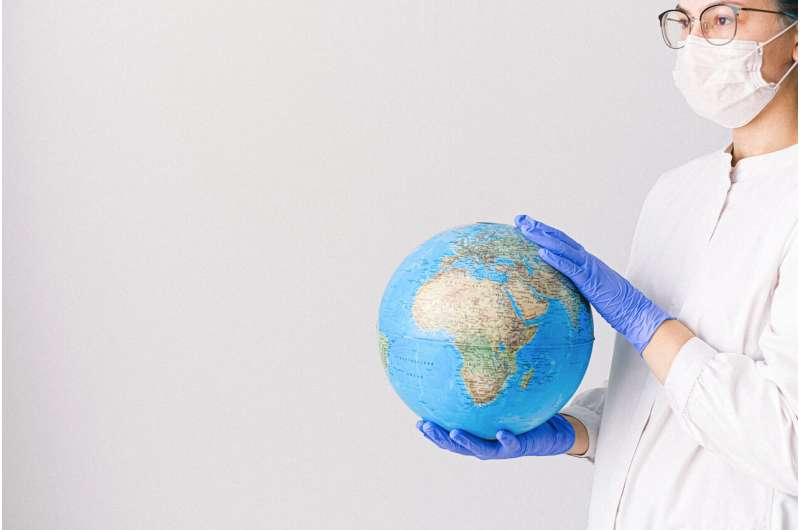Coronavirus is a wake-up call: our war with the environment is leading to pandemics

The COVID-19 pandemic sweeping across the world is a crisis of our own making.
That's the message from infectious disease and environmental health experts, and from those in – an emerging field connecting human health, civilisation and the natural systems on which they depend.
They might sound unrelated, but the COVID-19 crisis and the climate and biodiversity crises are deeply connected.
Each arises from our seeming unwillingness to respect the interdependence between ourselves, other animal species and the natural world more generally.
To put this into perspective, the (three out of every four) of new infectious diseases in people come from animals—from wildlife and from the livestock we keep in ever-larger numbers.
To understand and effectively respond to COVID-19, and other novel infectious diseases we'll likely encounter in the future, policymakers need to acknowledge and respond with "planetary consciousness". This means taking a holistic view of public health that includes the health of the natural environment.
Risking animal-borne diseases
Biodiversity (all biological diversity from genes, to species, to ecosystems) than at any time in human history.
We clear forests and remove habitat, bringing wild animals closer to human settlements. And we hunt and sell wildlife, often endangered, increasing the risk of disease transmission from animals to humans.
The list of diseases that have jumped from animals to humans ("zoonotic diseases") includes HIV, Ebola, Zika, Hendra, SARS, MERS and bird flu.
Like its precursor SARS, COVID-19 is thought to have and subsequently transmitted to humans via another animal host, possibly at a wet market trading live animals.
Ebola virus emerged in central Africa when land use changes and altered climatic conditions forced bats and chimpanzees together around . And Hendra virus is associated with urbanisation of fruit bats following habitat loss. Such changes are occurring worldwide.
What's more, human-caused climate change is making this worse. Along with habitat loss, shifting climate zones are causing wildlife to migrate to new places, where they interact with other species they haven't previously encountered. This increases the risk of new diseases emerging.
COVID-19 is just the latest new infectious disease arising from our collision with nature.
Due to its ability to spread at an alarming pace, as well as its relatively high mortality rate, it's the sort of pandemic experts have been from environmental degradation.
We saw this in 2018, for instance, when disease ecologist Dr. Peter Daszak, a contributor to the , coined the term "Disease X". This described a then-unknown pathogen predicted to originate in animals and cause a "serious international epidemic". COVID-19, , is Disease X.
Climate change makes us vulnerable
But in other profound ways. It's a risk multiplier, exacerbating our vulnerability to a range of health threats.
Earlier this year, all eyes were on the extensive, life-threatening bushfires and the resulting blanket of . This exposed more than half of the Australian population to health harm for many weeks, and led to the deaths of more than .
For infectious diseases such as COVID-19, air pollution creates another risk. This new virus causes a respiratory illness and, , exposure to air pollution worsens our vulnerability.
Particles of air pollution also , contributing to the spread of viruses and infectious disease across large distances.
A wake-up call
It might be clear to readers here that human health depends on healthy ecosystems. But this is rarely considered in policy decisions on projects that affect natural ecosystems—such as land clearing, major energy or transport infrastructure projects and industrial-scale farming.
The current COVID-19 pandemic is yet another warning shot of the consequences of ignoring these connections.
If we are to constrain the emergence of new infections and future pandemics, we simply our exploitation and degradation of the natural world, and urgently cut our carbon emissions.
Controlling the pandemic appropriately focuses on mobilising human and financial resources to provide health care for patients and prevent human to human transmission.
But it's important we also invest in tackling the through biodiversity conservation and stabilising the climate. This will help avoid the transmission of diseases from animals to humans in the first place.
The health, social and economic consequences of COVID-19 should act as a wake-up call for all governments to take stock, carefully consider the evidence, and ensure post COVID-19 responses reverse our war on nature. Because—as pioneering 20th century conservationist – a war on nature is ultimately a war against ourselves.
Provided by The Conversation
This article is republished from under a Creative Commons license. Read the .![]()
















